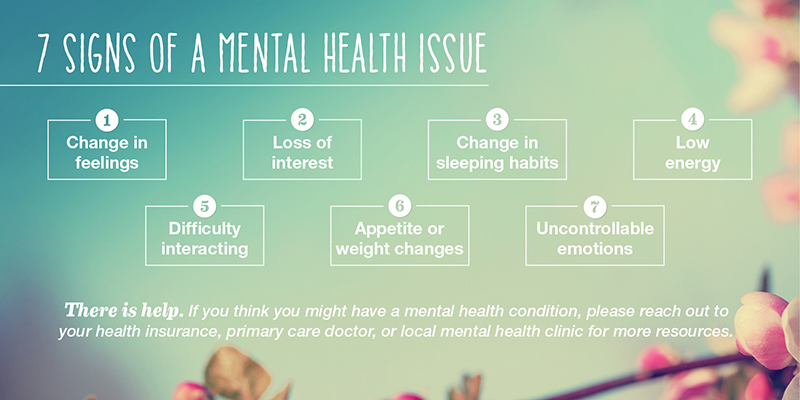- Joined
- Sep 8, 2020
- Messages
- 78
- Points
- 18
7 Signs of a Mental Health Condition
Mental illness doesn’t discriminate. A mental health condition can affect anyone regardless of age, socioeconomic status, ethnicity or gender.
The numbers are staggering. The National Alliance of Mental Illness reports nearly 44 million Americans experience a mental health condition every year—that’s about one in five adults. The events of the past year have led to even greater concerns over mental health. In fact, according to the Centers for Disease Control and Prevention, 40% of Americans said they struggled with substance abuse feelings of anxiety or depression during the COVID-19 pandemic.Mental health affects everything—it’s our emotional and psychological state of mind impacting how we think, feel and act. But when something feels out of whack, it can pose issues to your day-to-day routine and wellbeing.
Mental illness disorders include anxiety, bipolar disorder, depression, obsessive compulsive disorder, post-traumatic stress disorder, eating disorders and many others. The two most common mental health illnesses are depression, affecting more than 16 million Americans, and anxiety, which impacts over 42 million Americans. There is no single cause for mental illness—genetics, environment and lifestyle can all play a role.
Unlike illnesses of the rest of the body, mental illness has been swept under the rug for many years because it hasn’t been as widely accepted as a serious medical issue.
It’s important to remember that everyone will experience anxiety and sadness at some moment in their life. However, when that anxiety and sadness is overwhelming and occurs regularly, a mental illness may be the cause and you should seek help. You don’t have to live with the symptoms; there are resources available to feel better.
While every mental illness is different, here are seven common signs to help determine if you or a loved one may be suffering:
1. Change in feelings or demeanor
When a person is suffering from a mental illness, they may experience increased feelings of worry, panic, sadness or hopelessness.2. Loss of interest
They may start avoiding friends, family and activities that used to once bring pleasure.3. Change in sleeping habits
Sleeping patterns may change to sleeping too much or too little, especially when compared to previous sleep routines.4. Low energy
This can manifest itself as either sleeping too much, or having the inability to carry out everyday activities and tasks such as work or even self-care.5. Difficulty interacting
Many times people with a mental illness will find it hard to understand or relate to others. This may also present as extreme irritability with others or themselves.6. Appetite or weight changes
Dietary changes, whether it is excessive eating or little to no eating, is a large indicator of depression.7. Uncontrollable emotions
A distinct, rapid mood swing from sadness to happiness, or similar emotions on opposite ends of the spectrum, may be an indicator of mental health struggles.
Do any of these symptoms sound familiar? The best thing to do is to ask for help. A family doctor or mental health clinic can provide you with great options to help you get started. By getting help, you can take control of your symptoms and in many cases, recover completely.




